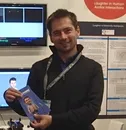
Website of the Workshop: http://machines-with-emotions.com/
Objectives
Modeling the human behavior and integration of it into robots and intelligent systems leads to not only a better understanding and acceptance of those systems by users but also a considerable increase in adaptability and flexibility of the intelligent entity which is at service.
Autonomous cars by definition are a very unique type of service robots with a high level of complexity in their functions and services. Proactiveness and personalization, as the key aspects of comfort functions in the vehicle, along with the safety concerns in highly automated driving, require a good understanding of the current emotional status of the user and his intentions accordingly. Studying the human behavior in the cabin and its differences from other environments is the very first step in paving the road for further progress in this field and requires close coordination between the behavioral science, psychology and computer science besides automotive engineering. Yet, developing generic models based on emotional behavior of the driver/passenger for emotion recognition systems is at its early stages. There is still a lack of proper fusion strategies for different modalities of data and sensory inputs in affect recognition which varies from use case to use case, altogether with the absence of the proper databases which are collected accordingly for the purpose of studying and training the AI-based functions. Meanwhile, defining the evaluation criteria for the systems which employ the emotional status of the user in the car seems to be a critical matter.
This workshop aims to gather experts active in related scientific domains with the industry experts, dealing with the state-of-the-art technology in autonomous driving in order to shed a light on the currently existing challenges and their importance, with forming serious discussions. Our last but not least goal is to draw an outline for the close coordination of the research fields of robotics, humanoids, human-robot interaction, autonomous driving, emotion recognition, behavioral science, psychology, and affect recognition.
Scope and Topics of Interests
Our main focus in this workshop is exclusively (but not limited) on the following aspect:
Affect Modeling
- Emotion representation and modeling of humans
- Modeling human behavior according to the emotional state
- Embedding affective models in cars
- Machine learning in human behavior modeling
Multimodality
- Multimodality in emotion recognition systems
- Multimodal databases for affect recognition
- Affective data acquisition technologies
- Approaches to obtaining reliable ground truth and affective data
- Approaches to annotating and mapping the expressive behavior to emotional states
- Sensory data fusion methods and approaches for emotion recognition systems
Application and Evaluation
- Maintaining emotional awareness in autonomous cars
- New benchmarks for measuring the accuracy of emotion recognition
- Emotionally Intelligent Personal Assistants for self-driving cars
- Preserving privacy in developing multimodal databases
- Approaches to evaluating the robustness of the emotion recognition systems
Call for Contributions
Will be announced soon
Invited Speakers
Martin Arend (or) Michael Wütenberger
General Manager E/E Architecture and Technology, BMW Research, Innovations, New Technology, Germany
Prof. Björn Schuller
Full professor and head of the “Chair of Embedded Intelligence for Health Care and Wellbeing”, University of Augsburg, Germany / Professor of Artificial Intelligence & head of “GLAM-Group on Language, Audio & Music”, Imperial College London, UK / Chief Scientific Officer (CSO) and Co-founding CEO, audEERING GmbH, Gilching, Germany
Prof. Midori Sugaya
Associate Professor at department of computer science and engineering, college of engineering, “Shibaura Institute of Technology”, Japan
Prof. Bao-Liang Lu
Professor and Directors at Center for Brain-like Computing and Machine Intelligence, Key Laboratory of Shanghai Commission for Intelligent Interaction and Cognitive Engineering, Department of computer science and engineering, Shanghai Jiao tong University
Dr. Soujanya Poria
Presidential postdoctoral fellow, Nanyang Technological University, Singapore
Prof. Hatice Gunes
Associate Professor at university of Cambridge’s department of computer science and technology / Visiting academic, school of EECS, Queen Mary University of London
Prof. Zipping Zhao
Associated Professor and Vice Dean of the college of computer and information engineering of “Tianjin Normal University”
Main Organizers
Co-Organizers

Dr. Radoslaw niewiadomski, Researcher
CONTACT Unit, Istituto Italiano di Tecnologia,
Email: radoslaw.niewiadomski@iit.it

Dr. Stefan Kugele, Postdoc Researcher in the Software and Systems Engineering,
Technical University of Munich,
Email: stefan.kugele@tum.de

Morteza Hashemi Farzaneh, M. Sc., Research Assistant & PhD Candidate
Technical University of Munich,
Email: hashemif@in.tum.de
Intended Audience
The main target group of this workshop are the scientists and researchers active in the fields of robotics, humanoids, human-robot interaction, autonomous driving, emotion recognition, behavioral science, psychology, and affect recognition. Developers and implementers from robotic and automotive industries are also invited to enhance the discussions on identifying the demands and requirements from industry perspective.
Program
Will be announced soon
We Are Proudly Endorsed by
- IEEE Computational Intelligence Society Technical Committee on Cognitive and Developmental Systems (CDS), Task Force of Human- Robot Interaction (HRI)
- IEEE Intelligent Systems Application Technical Committee (ISATC)






